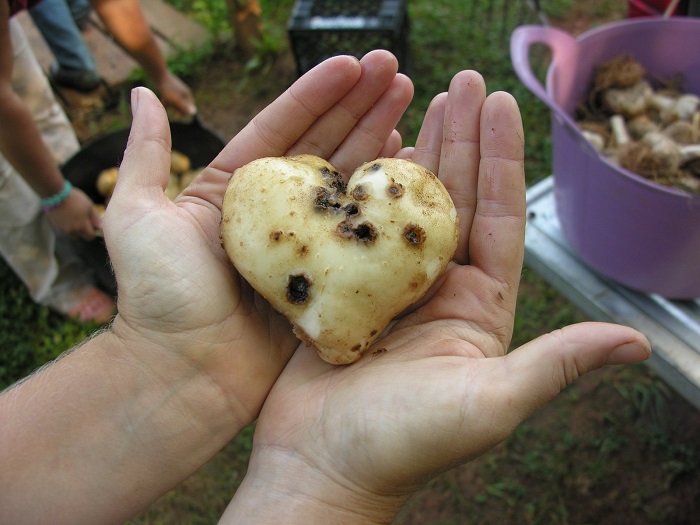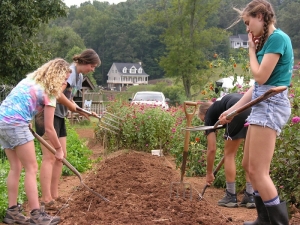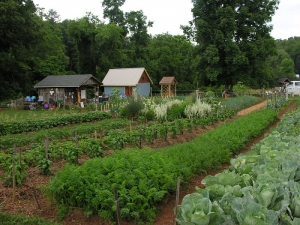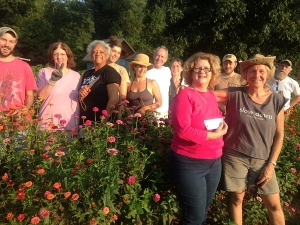
Susan Sides (right), executive director of The Lord’s Acre, with volunteers.
Susan Sides is a patient soul. It shows in her demeanor, in her voice, in her eyes and in her smile. Perhaps the garden has taught her that. A garden, after all, offers many lessons. For Susan, gardening has been a part of her life’s work. Before she became executive director of The Lord’s Acre in Fairview, North Carolina, outside of Asheville, she was a garden manager and garden writer for Mother Earth News.
Susan speaks eloquently of what grows in a garden. Because of her time there – particularly this half acre community garden where all are welcome – she talks of the wonders of a garden. No doubt, food is important but, as Susan says, “a garden feeds people in a lot of ways.”
It feeds those who are hungry. Last year, more than nine tons of nutritious, delicious fruits and vegetables were planted, tended, nurtured and coaxed into an abundant harvest at The Lord’s Acre. Nine tons! And 3,000 volunteer hours. Is that what success looks like? Yes and no, according to Susan.
The true growth of this garden can’t be measured. Spend just a few moments here and you’ll quickly see it’s about more than royally purple eggplants and hearty red tomatoes.
Growing Relationships
The garden grows relationships. It ministers. It heals. It is an organic, growing environment where people learn to trust 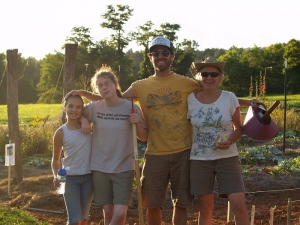
“Life began in a garden,” says Susan. “And I am hard-pressed to find another place where anyone from anywhere is welcomed. It brings people together. It’s also where relationship originally broke but where it grows. There are many places people gather, even places where people feel welcome, but there are almost no spaces where diverse groups of people come together to work, serve and talk and listen to one another, whether it’s telling funny stories or discussing important issues of the day. No one is going to go to a movie theater, a restaurant, a coffee shop, a tailgate market, their kid’s ballgame, a park, a music performance or any such public space and have the opportunity to really talk and listen to others who are very different from themselves. Working together for a common good outside of ourselves seems to create a space where that can happen and where people feel safe and valued.”
The name, and the movement, The Lord’s Acre, originated during the Depression as a way for farmers to give part of what they grew or raised to their local church, based on the Biblical principal of giving back to the Lord. The food was then distributed to people in need. During the Depression years when soup lines were long an d neighbors were hungry, it was God’s work indeed and they called it The Lord’s Acre. That original movement eventually spread all over the world.
People are still hungry. In 2008, a group of friends who had been involved in assisting a local food pantry got together. One 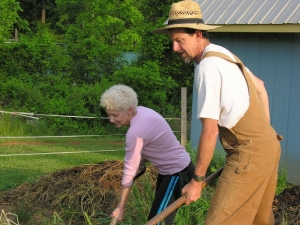
As it often goes with good ideas and a group of pro-active friends, one thing can lead to another. Susan was no longer working at the magazine and had finished homeschooling two of her sons when friends coaxed her into the new venture of establishing a nonprofit organization that was centered on organic gardening. They named the new garden The Lord’s Acre to honor the farmers before them.
After hearing Susan talk about The Lord’s Acre, perhaps the coaxing to become head gardener actually came from elsewhere. It truly sounds as if this is her calling and the group provided a big nudge that helped her recognize it.
The Welcoming Garden
Despite its name, the Lord’s Acre isn’t affiliated with any particular denomination or church. It welcomes a diverse group of 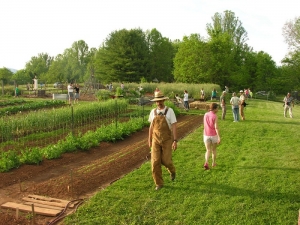
“I love the model,” shares Susan. “Our board is diverse. Our community is diverse. I can talk candidly and openly about my faith with Buddhists, Muslims, those of the Jewish faith and others.”
One of the goals of The Lord’s Acre – in addition to growing food – is to create a space where people are free to talk. And in that sense, it’s a welcoming garden.
“It is sometimes difficult for giving gardens at churches to get people to volunteer,” explained Susan, “but The Lord’s Acre has a reputation that gets around. It is a place people can come and not have to be concerned about fitting into a group that adheres to a certain set of beliefs. An intentionality to create a space that feeds people in many ways is paramount.”
Susan acknowledges that the original intent was to grow produce to send to the food pantry, yet the garden has evolved in many ways. While she notes that a garden manager leads a garden in the way he or she is comfortable, Susan cites three major influences in the spirit of the place.
“My past experiences were an influence,” she explains. “The board and their experience is another. The community is another. We often hear people say ‘I wish we had that or I wish we could do this.’”
It’s clear this is a place where listening to others is important, and engaging them is paramount to the garden’s ethos.
The Learning Garden
Indeed, The Lord’s Acre is a learning garden. No doubt volunteers, even those who are lifelong gardeners, learn from the 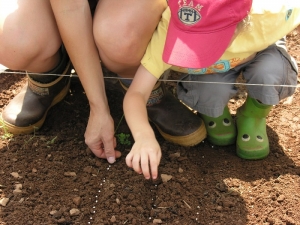
Susan is quick to add that the work is always exciting for her because she, too, is always learning from the board, the community, the interns, the volunteers, other gardeners and the garden itself.
Interns often help with the Sprouts Program at the garden. For 3- to 8-year-old children, the program is intentionally kept to a small number (10) to give the youngsters the chance to play, explore, plant and harvest in the garden once each week. While they are immersed in garden activity, their parents are able to serve their community, learn more about gardening or share what they know, and are included in whatever project the garden needs that day.
“It’s an intentional experience for these children,” says Susan. “Each kid wants to feel heard and seen.”
Interns of all ages work in the garden. While many are in their 20s; they have had interns in their 40s. There is no age limit 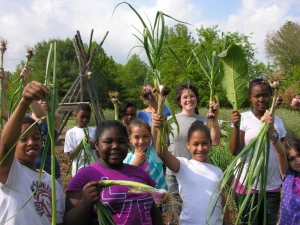
Interns go on to serve in communities around the world. Susan, the proud mentor, shares that one has started her own nonprofit in California to plant fruit trees, getting entire communities to sign on. Another is working with a community in Africa to help with a school garden. Another is looking to start a restaurant and to help the homeless become trained as cooks.
Warren Wilson College Involvement
Nearby Warren Wilson College is an important partner in this relationship with community. Students have been involved in 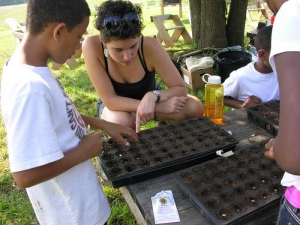
The Lord’s Acre started a Share-the-Harvest Market last year, involving the greater community in donating leftover produce from their own gardens to fill the free market every week.
Open Volunteer Night
For those interested in helping with the garden, every Wednesday night is open volunteer night.
“Many people worry about volunteering if they are not gardeners already,” Susan notes, “but we welcome everyone of any skill level and make it a point to have garden staff on each project so no one feels lost. There will be someone there to show them the way and to guide them.”
“There is a lot of loneliness in this world,” she says. “A lot of people don’t have a community of people and we can become a place where people can come hang out. We don’t care what political party you belong to. We don’t care about your economic class. All are welcome in this garden. Sometimes you can’t get that in your own family.”
She continues, “When we are weeding carrots, there is real listening going on. Part of it is the space, part of it is the meaningful work. People feel that it is important. People are bringing their children to show how food is grown and that it will go to help someone.”
Art and Music in the Garden
Beauty in the garden’s environment is paramount as well.
“When you are struggling, it’s nice to be in a place of beauty,” Susan shares. “We bring in music and art to make it a beautiful space. It’s a space where no one is trying to get money from you or manipulate you in any way.”
As executive director, Susan is the lead gardener and she readily acknowledges there is a much bigger force at work. “This is God’s universe,” she says. “You are going to discover something in the garden that maybe we haven’t discovered. Show us! Your questions count! You are important.”
The goal, Susan says, is for people to feel heard, empowered and inspired.
“Churches are so passionate about seeing a connection to their faith and their church in the real world,” she explains. “The garden brings a fresh look at their faith. Working in the garden is much more tangible than writing a check.”
Susan sees the many miracles that occur each day in the garden, including the physical miracles. She quotes Wendell Berry, “The light lies down in dung heap and rises up again in the corn.” Then she adds, “You can’t beat it when someone has planted a seed and then sees it grow. Adult people squeal! A lot of people express the power of the garden, saying they didn’t know gardening could be so beautiful. Or they didn’t know it could create so much food. Or they didn’t know they would enjoy working with people they don’t know. Not everyone agrees with one another but they listen to each other. The garden helps people make a connection between what they believe and how it impacts what they can do.”
Feed My Sheep: All Are Welcome at this Table
As the garden has grown, so, too, has the overall effort of The Lord’s Acre. In addition to providing fresh produce to the food 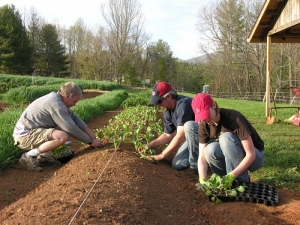
In Fred Bahnson’s book, “Soil and Sacrament,” he includes a section on The Lord’s Acre. He asks Barbara Trombatori, a Fairview resident, who started the Fairview Welcome Table, what her motivations were. He quotes Barbara, “in the scriptures Jesus asks Peter three times, ‘Do you love me?’ And he says, ‘Yes, Lord.’ Then Jesus tells him, ‘Feed my sheep.’ I decided that’s what I want to do. Feed his sheep. And he lets me.”
No doubt, the garden presents challenges: someone stealing the harvest, long hours on hot days, meeting others’ needs, 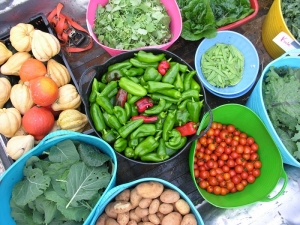
Learn more about The Lord’s Acre at www.thelordsacre.org.
Special thanks to The Lord’s Acre for the photographs!

